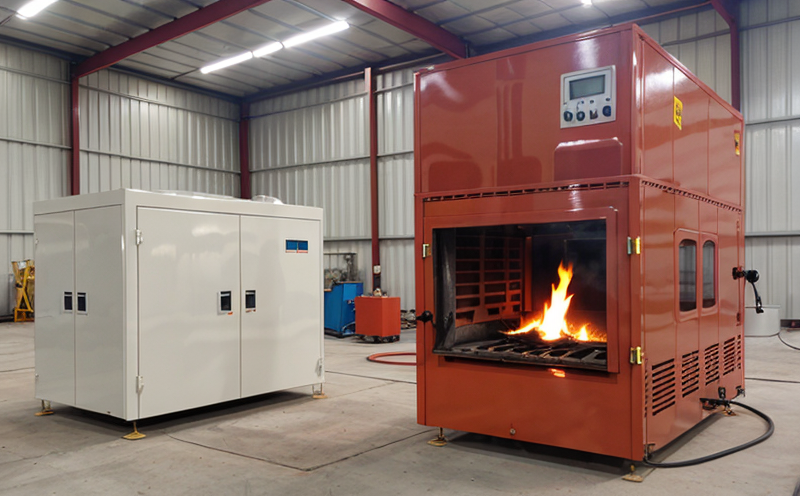ISO 6721 Dynamic Thermal Mechanical Properties Testing
The ISO 6721 standard provides a standardized method for determining the dynamic mechanical properties of materials, particularly useful in identifying the behavior of materials under alternating stress and temperature conditions. This service is critical for industries that require precise control over material performance during thermal cycling or exposure to varying temperatures.
In metallurgy and material testing, understanding how materials respond dynamically to thermal changes can be crucial for product design and quality assurance. For instance, in aerospace applications where materials are exposed to extreme temperature fluctuations, knowledge of their dynamic properties helps ensure reliability under operational conditions. In automotive manufacturing, this test is essential for selecting materials that will withstand a wide range of operating temperatures without degradation.
The dynamic thermal mechanical properties testing process involves subjecting samples to controlled heating and cooling cycles while measuring the resulting changes in shape and size. The primary apparatus used includes oscillatory systems capable of applying alternating stress to the specimen at various frequencies, allowing for the calculation of key parameters such as storage modulus (G' - a measure of elastic response), loss modulus (G'' - related to viscous behavior), and damping factor.
Specimen preparation is critical; materials must be carefully prepared according to ISO 6721 guidelines. This includes ensuring that the sample geometry is consistent across specimens, minimizing surface roughness, and avoiding defects like cracks or inclusions which could skew results. The type of specimen depends on the material being tested but typically involves small cylindrical samples or flat plates.
The testing procedure itself requires precise control over temperature and frequency to ensure accurate measurement of thermal mechanical properties. Temperature ranges can vary widely depending on the application, from cryogenic temperatures down to ambient conditions up to extremely high temperatures. Frequencies used are often in the range of 10 Hz to several kHz.
The results obtained from this testing provide valuable insights into a material's ability to maintain its structural integrity and mechanical performance under thermal stress. These tests help engineers and scientists predict how materials will behave in real-world scenarios, allowing for better design decisions and improved product durability.
- Benefits: Early identification of potential failure points, optimized material selection, enhanced product reliability.
- Quality and Reliability Assurance: Compliance with industry standards, improved process control, reduced waste through accurate material characterization.
Why It Matters
Understanding a material's dynamic thermal mechanical properties is vital for ensuring that components function correctly across their intended operating conditions. In sectors like aerospace, automotive manufacturing, and electronics production, where materials are subjected to rapid temperature changes or cyclical loads, the ability to predict performance accurately can mean the difference between successful operation and catastrophic failure.
For example, in the aerospace industry, jet engines operate at temperatures that fluctuate dramatically from start-up to shutdown. The materials used must not only withstand these extreme conditions but also maintain their mechanical integrity over time. By using ISO 6721 testing, manufacturers can ensure that the materials they select will perform as expected under such demanding conditions.
In automotive manufacturing, vehicles are exposed to a wide range of environmental factors including heat from engine operation and cold during winter months. The dynamic thermal mechanical properties test ensures that components like exhaust systems or braking systems remain robust through these cycles without showing signs of fatigue or failure.
Benefits
- Enhanced Material Selection: Identifying materials with optimal thermal mechanical properties for specific applications.
- Informed Design Decisions: Helping engineers make informed choices about material types and structures based on their dynamic behavior.
- Improved Product Durability: Ensuring that products can withstand harsh environmental conditions without compromising performance or safety.
- Predictive Maintenance: Providing data that supports the development of predictive maintenance strategies, reducing downtime and repair costs.
- Compliance with Standards: Guaranteeing adherence to international standards like ISO 6721 which is essential for global market access and regulatory compliance.
- Reduced Waste: By accurately characterizing materials, manufacturers can reduce waste associated with trial-and-error approaches during development phases.
Quality and Reliability Assurance
The ISO 6721 dynamic thermal mechanical properties test plays a crucial role in quality assurance by providing empirical data that can be used to verify the performance of materials against specified requirements. This testing ensures that products meet not only current standards but also future expectations, contributing significantly to long-term reliability.
Through rigorous testing procedures, companies can identify any discrepancies between expected and actual behavior early in the development process, allowing for timely corrections before large-scale production begins. This proactive approach helps maintain high quality levels throughout the product lifecycle, thereby enhancing customer satisfaction and brand reputation.
Compliance Assurance: By adhering to ISO 6721 guidelines, organizations demonstrate their commitment to maintaining consistent standards across all aspects of material testing. This is particularly important for industries regulated by stringent safety requirements where non-compliance could lead to severe penalties or even business closure.
Process Control: Continuous monitoring using this test allows manufacturers to fine-tune production processes, ensuring that every batch produced meets the desired specifications. This level of precision leads to more consistent products and fewer defects reaching end-users.





